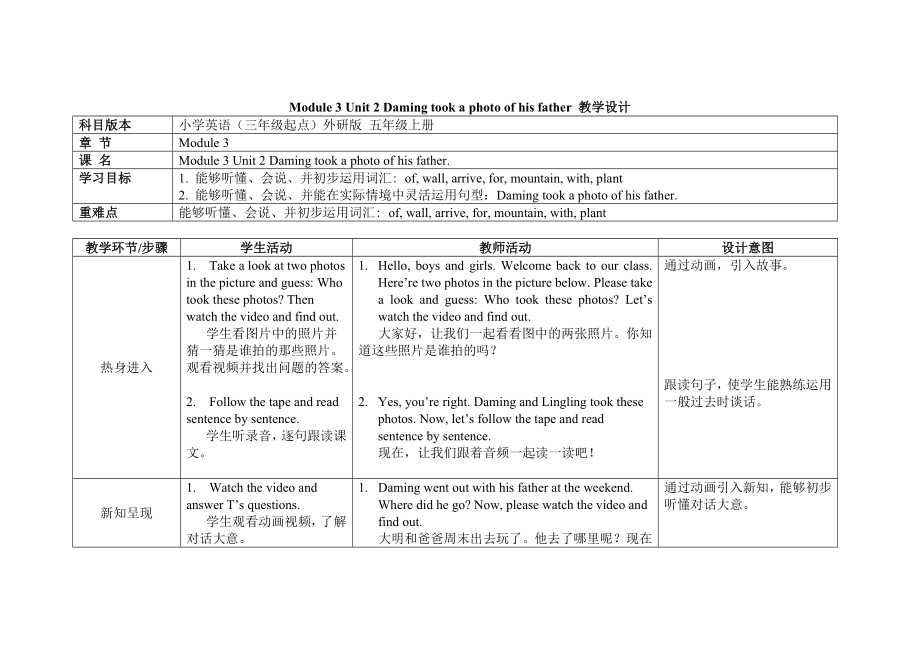《五年級上冊英語教案Module 3 Unit 2 Daming took a photo of his father外研社(三起)》由會(huì)員分享���,可在線閱讀�����,更多相關(guān)《五年級上冊英語教案Module 3 Unit 2 Daming took a photo of his father外研社(三起)(5頁珍藏版)》請?jiān)谘b配圖網(wǎng)上搜索��。
1�����、Module 3 Unit 2 Daming took a photo of his father 教學(xué)設(shè)計(jì)
科目版本
小學(xué)英語(三年級起點(diǎn))外研版 五年級上冊
章 節(jié)
Module 3
課 名
Module 3 Unit 2 Daming took a photo of his father.
學(xué)習(xí)目標(biāo)
1. 能夠聽懂���、會(huì)說�����、并初步運(yùn)用詞匯: of, wall, arrive, for, mountain, with, plant
2. 能夠聽懂����、會(huì)說����、并能在實(shí)際情境中靈活運(yùn)用句型:Daming took a photo of his father.
重難點(diǎn)
能夠聽懂�����、
2�����、會(huì)說、并初步運(yùn)用詞匯: of, wall, arrive, for, mountain, with, plant
教學(xué)環(huán)節(jié)/步驟
學(xué)生活動(dòng)
教師活動(dòng)
設(shè)計(jì)意圖
熱身進(jìn)入
1. Take a look at two photos in the picture and guess: Who took these photos? Then watch the video and find out.
學(xué)生看圖片中的照片并猜一猜是誰拍的那些照片��。觀看視頻并找出問題的答案����。
2. Follow the tape and read sentence by sentence.
學(xué)
3、生聽錄音��,逐句跟讀課文�。
1. Hello, boys and girls. Welcome back to our class. Here’re two photos in the picture below. Please take a look and guess: Who took these photos? Let’s watch the video and find out.
大家好,讓我們一起看看圖中的兩張照片��。你知道這些照片是誰拍的嗎�����?
2. Yes, you’re right. Daming and Lingling took these photos. Now
4�、, let’s follow the tape and read sentence by sentence.
現(xiàn)在,讓我們跟著音頻一起讀一讀吧��!
通過動(dòng)畫,引入故事��。
跟讀句子��,使學(xué)生能熟練運(yùn)用一般過去時(shí)談話����。
新知呈現(xiàn)
1. Watch the video and answer T’s questions.
學(xué)生觀看動(dòng)畫視頻,了解對話大意����。
2. Read the text and choose the right answers to the questions.
學(xué)生閱讀課文,選擇正確的答語��。
3. Chec
5�����、k the answers.
核對答案���。
4. Listen to the tape again, and try to write the missing words.
再聽錄音����,試著填詞��。
5. Check the answers.
核對答案���。
6. Write sentences with the given words
用題目所給的詞寫句子����。
7. Check the answers.
核對答案�。
8. Watch and follow the video and read sentence by sentence.
學(xué)生觀看動(dòng)畫,并
6�、逐句跟讀。
1. Daming went out with his father at the weekend. Where did he go? Now, please watch the video and find out.
大明和爸爸周末出去玩了�。他去了哪里呢?現(xiàn)在請跟隨動(dòng)畫來聽一聽����,看一看吧!
2. Well done. Daming went to the Great Wall with his father. Now, let’s read the text and choose the right answers to the questions.
現(xiàn)在��,讓我們閱讀
7��、課文�����,選擇正確的答語吧���。
3. Have you got the right answers? Let’s check.
你們都選對答語了嗎����?
4. Please listen to the tape again, and try to write the missing words.
請同學(xué)們再聽錄音,試著填一填吧����。
5. Have you got the right answers? Let’s check.
讓我們來核對答案吧。
6. Can you write sentences with the given words?
8���、Have a try, please!
你能用題目所給的詞寫出句子嗎����?請?jiān)囈辉嚢桑?
7. Now, let’s check the answers.
讓我們核對答案吧���。
8. You’ve done a very good job! Now, please follow the video and read sentence by sentence.
讓我們跟著動(dòng)畫聽一聽���、讀一讀吧!
通過動(dòng)畫引入新知����,能夠初步聽懂對話大意。
通過閱讀選擇答句����,鞏固如何運(yùn)用一般過去時(shí)談?wù)撨^去發(fā)生的事���。
核對答案����。
感知?jiǎng)釉~過去
9、式的變化規(guī)則���。
核對答案��。
讀課文�����,通過寫句子感知如何陳述過去發(fā)生的事情����。
核對答案�����。
通過觀看動(dòng)畫鞏固所學(xué)�。
分步訓(xùn)練
1. Read the text and answer the questions.
學(xué)生閱讀并回答問題��。
2. Check the answers.
學(xué)生核對答案�����。
3. Listen and follow the tape.
學(xué)生跟讀錄音����。
4. Listen and underline the letters that make the sound. Then say t
10�����、he words.
學(xué)生聽錄音��,劃出發(fā)音的字母����。然后大聲說一說。
5. Check the answers
學(xué)生核對答案���。
6. Learn a song. First, listen to the lyrics and try to repeat.
學(xué)生聽錄音�����,跟讀歌詞���。
7. Enjoy the song and sing together.
學(xué)生欣賞歌曲��,然后試著跟唱����。
1. We’ve just learned about Daming’s weekend. Can you answer the following questions?
同學(xué)
11�、們��,你們能回答這些問題嗎���?
2. Let’s check the answers.
同學(xué)們��,讓我們核對答案吧��。
3. Now, please listen and follow the tape.
現(xiàn)在��,請跟隨錄音說一說吧���。
4. Let’s listen and underline the letters that make the sound. Then say the words.
現(xiàn)在,讓我們聽錄音�����,劃出發(fā)音相同的字母,然后大聲說一說���。
5. Let’s check the answers now.
現(xiàn)在讓我們來核對答案吧��。
12����、6. Now, let’s learn a song. First, please listen to the lyrics and try to repeat.
請同學(xué)們聽錄音�,跟讀歌詞。
7. Let’s enjoy the song and sing together.
接下來我們來欣賞一首歌曲��,然后試著跟唱一下吧��。
通過回答問題�����,回顧課文所學(xué)����。
核對答案。
學(xué)習(xí)本課中出現(xiàn)的音標(biāo)組合的發(fā)音�。
學(xué)習(xí)本課中出現(xiàn)的音標(biāo)組合的發(fā)音。
核對答案。
通過學(xué)習(xí)歌詞�����,回顧如何對過去發(fā)生的事進(jìn)行提問和如何陳述過去發(fā)生的事���。
13�、
通過學(xué)唱歌曲���,鞏固加深如何對過去發(fā)生的事進(jìn)行提問和如何陳述過去發(fā)生的事���。
嘗試應(yīng)用
1. Look at the picture, read the words and the sentences.
看圖片�,讀單詞和句子。
2. Work in a group of four and make sentences. Each student chooses one expression from the boxes and then the last student tries to make a sentence.
四個(gè)同學(xué)一個(gè)小組��,其中三位同學(xué)分別從盒子里選出一個(gè)詞匯
14�����、�����,第四名同學(xué)試著造一個(gè)句子���。
3. Make a survey of trips.
調(diào)查一下同伴的旅行����。
1. Now, look at the picture, read the words and the sentences.
請同學(xué)們看圖片,讀單詞和句子����。
2. Let’s work in a group of four and make sentences. Each student chooses one expression from the boxes and then the last student tries to make a sentence.
15、
四個(gè)同學(xué)一個(gè)小組���,其中三位同學(xué)分別從盒子里選出一個(gè)詞匯�,第四名同學(xué)試著造一個(gè)句子�。
3. Please make a survey of trips with your partner. Here’re some sentences for your reference.
最后讓我們來調(diào)查一下同伴的旅行吧。
練習(xí)陳述過去發(fā)生的事�。
小組活動(dòng)練習(xí)陳述過去發(fā)生的事。
能在實(shí)際情境中運(yùn)用所學(xué)的句型��。調(diào)查一下同學(xué)們的旅行��。
作業(yè)布置
今天我們學(xué)習(xí)了如何談?wù)撝苣┥?��,大家都學(xué)會(huì)了嗎��?課后就讓我們用學(xué)過的句子跟家人討論一下吧�!
課堂內(nèi)容小結(jié)
進(jìn)步標(biāo)志
1. 能夠聽懂、會(huì)說��、并初步運(yùn)用詞匯: of, wall, arrive, for, mountain, with, plant
2. 能夠聽懂����、會(huì)說、并能在實(shí)際情境中靈活運(yùn)用句型:Daming took a photo of his father.
 五年級上冊英語教案Module 3 Unit 2 Daming took a photo of his father外研社(三起)
五年級上冊英語教案Module 3 Unit 2 Daming took a photo of his father外研社(三起)

